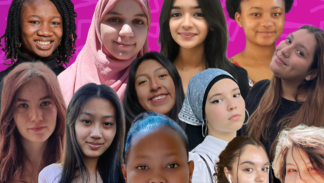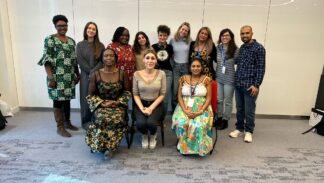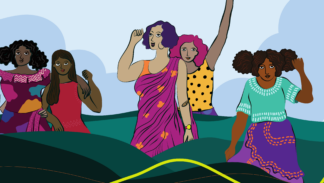Reflections on Istanbul Women’s Museum Conference: Centers of Social Memory and Places of Inclusion
Contributed By:
Meral Akkent, Founder and Curator, Women’s Museum Istanbul
Catherine M. King, Head of Advocacy and Executive Producer, Global Fund for Women
“I hate silence when it is time for speaking”
– Kassia, born 810-867 in Constantinople (now Istanbul). She is the first female composer in world history whose compositions exist today and her story is told in the Istanbul Women’s Museum.
In October 2016 the Women’s Museum Istanbul in partnership with Istanbul Bilgi University, Faculty of Communication, brought together leaders of women’s museums from around the world with Turkish feminists, grassroots women’s rights leaders, artists, academics, and students to discuss memory, inclusion, and the role that women’s museums can play in 21st century society. Held in Istanbul at the beautiful SALT Galata non-profit cultural center, Global Fund for Women was proud to be one of the sponsors alongside the Open Society Foundation Turkey and others.
With a backdrop of tightening restrictions on women’s rights in Turkey, increasing global trends towards conservatism throughout the world, and anticipation of the then upcoming US presidential election the theme of the convening to look at women’s museums as peace-culture actors took on a heightened sense of urgency. Over three days, more than 150 participants discussed and defined the role of women’s museums as critical places for inclusion. Participants explored the idea of women’s museums as places that document and raise awareness of the contributions of women and marginalized people, and open up a space for debate and social involvement. Over all, attendees of the conference agreed that inclusion is needed more than ever in our world, and is one of the essential factors to preventing conflicts in societies.
Our hosts at the Women’s Museum Istanbul set the stage for an invigorating conference which brought in perspectives and experiences drawn from the more than 70 women’s museum now operating around the world. Opened in 2012, and one of the newest, the Women’s Museum Istanbul is a virtual museum with a website in Turkish, English, German, and Italian. Dedicated to more than 2,600 years of women’s history in the city of Istanbul, the aim of the museum is to amplify the history of women’s contributions in Turkey—a history which was lost, obscured, or disowned by mainstream opinion—and to share that history as a counterpart to male-dominated historical writing.
Program sessions, dialogues, and workshops focused on how museums contribute to a culture of peace; intersectionality and mapping the margins; inclusive museum practices at both the local and global level; and documenting the work of grassroots women’s rights activists and women human rights defenders. Keynote presenters came from women’s museums in Germany, Austria, Denmark, Italy, Sweden, and Turkey, as well as thematic museums such as the Girl Museum and Women’s Active Museum on War and Peace (Japan), and the International Council of Museums (ICOM) and International Association of Women’s Museums (IAWM).
On behalf of Global Fund for Women, Catherine was invited to present on the 2014 merger between Global Fund for Women and International Museum of Women. She shared how the merger has accelerated Global Fund for Women’s work strengthening the women’s movement through art, media, and storytelling, and shared stories and impact from recent creative advocacy campaigns including Imagining Equality, Determined, and DefendHer.
Conference attendees were especially energized by the participation of the next generation – young women, men, and trans* activists who contributed throughout the convening, students from Sabanci University and Gender Forum led attendees on a “Curious Steps: Gender and Memory Walk” through the streets of Beyoglu, one of the most historic parts of Istanbul with a long and rich history of cultural diversity. As we walked the crowded streets, we learned the untold and silenced stories of women who lived and worked in the neighborhood and have contributed to Turkish art, culture, and political life. From women like Zabel Yesayan, who wrote prolifically on women’s rights, war, and peace at the turn of the century, to Beki Luzia Bahar, the first Jewish women playwright of Turkey, to Ayse San, one of the most influential female singers in the history of Kurdish music. We also learned about important actions taken by the LGBTQI movement and feminist movement in Gezi Park, starting with the 1987 hunger strike against police violence toward the gay and trans community. While feminist women in Turkey have been visible in international media because of the Gezi Park protests, we learned that the history of the women’s movement in Turkey dates back to the late Ottoman period when Muslim and non-Muslim women initiated demands for the right to education and to work.
Bringing this spirit of activism and movement-building to the present day, as the conference concluded we resolved that international and interdisciplinary solidarity is more important than ever. For the Istanbul Women’s Museum, one of the most important long-term aims of the conference is to ensure that, in the context of museums in Turkey, the topics “social memory” and “inclusion” continue to be discussed amongst students of museum studies, museum practitioners, and in academic and cultural circles. Cooperation with the Istanbul Bilgi University, Faculty of Communication and with Ms. Suay Aksoy, current director of ICOM (International Council of Museums) and founding chairwoman of the Association of Museum Professionals (MMKD), Turkey’s first independent association of museum professionals, and IAWM (the International Association of Women’s Museums), will carry the impact of the conference further.
The Istanbul conference reinforced our collective commitment to make the voices of women’s museums and the voices of women in our communities heard, and to make our work visible. Women’s museums and organizations are speaking in many ways and we recognized the important contributions women’s museums can make together towards a more inclusive and peaceful world. Organizations and individuals interested in learning more and getting involved are welcome to the reach out to the International Association of Women’s Museums, a global network of women’s museums.


